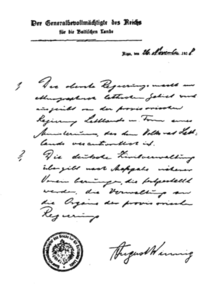August Winnig
Early involved in trade unionism and editorship, Winnig held elected and public offices from 1913 to 1921 as a Social Democratic Party (SPD) member.
He was nominated Oberpräsident of East Prussia in 1919, and pressured the Weimar Republic (1918–1933) to create an autonomous State in the eastern Baltic Sea region.
After his participation in the Kapp putsch of 1920 against the Weimar Republic, Winnig was removed from his position by the regime and expelled from the SPD, in which he belonged to the "social-imperialistic" wing.
He then became more involved into far-right thinking and, along with Ernst Niekisch, joined the Old Social Democratic Party of Germany (ASP), a splinter group of the SPD with nationalistic tendencies.
Initially welcoming the Nazis in 1933 as providing the "salvation of the State" from Marxism, his Lutheran convictions led Winnig to oppose the Third Reich (1933–1945) for its neo-pagan tendencies.
[4] In January 1919, after being appointed Oberpräsident of East Prussia by the Weimar Republic,[1] Winnig devised a plan for the creation of an autonomous State in the eastern Baltic Sea region that would have included Livonia, Kurland, Lithuania and East and West Prussia, with the false assumption that the victorious powers of WWI would concentrate their demands on Germany itself and let alone a separatist eastern State.
He wrote that "the East Prussian separatism was a special form of expression of national indignation", with the intention of entering into war against Poland to achieve statehood.
[5] Although Winnig and the Baltic German landowners had in mind the integrity of the Reich, they talked about a "break away from Berlin" as a mean of exerting pressure on the rest of Germany to achieve their project.
He theorised an idea of 'national' socialism based on trade unions, criticising the anti-German influence of bourgeois intellectuals on the workers' movements, and writing about the "infiltration by foreign elements" (Ueberfremdung) in the SPD leadership.
[3] Initially welcoming the Nazis as providing the "salvation of the State" from Marxism, his Lutheran convictions led him to oppose the Third Reich for his neo-pagan tendencies.
Writing about "spatial ties" (Raumverbundenheit) and "cultural community" (Kulturgemeinschaft),[12] he claims that the greater nations of Europe, along with the other less powerful peoples of the continent, all stem from the same superior civilisation, a legacy of Rome, the Ancient Germans, and Christianity.
